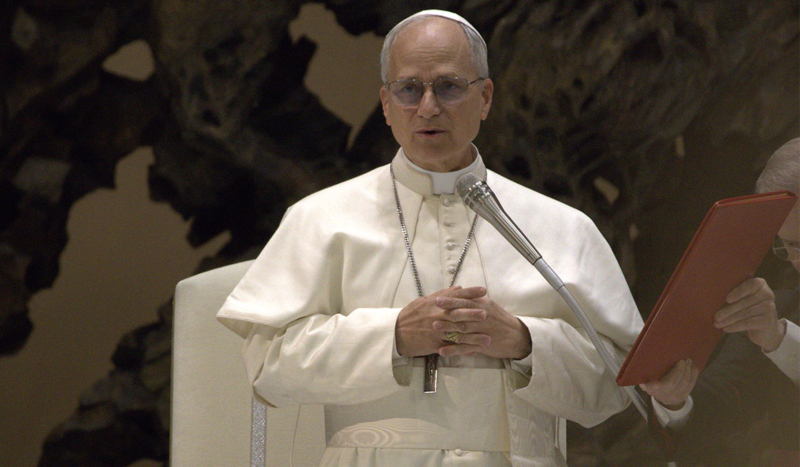
Pope Leo XIV during an audience with the media (May 12, 2025) / Edgar Beltrán
VATICAN CITY // In a May 17 address to members of the Centesimus Annus Pro Pontifice (CAPP) Foundation, Pope Leo XIV encouraged them to continue sharing Catholic social doctrine especially amid the current issues in the world.
“In our day, there is a widespread thirst for justice, a desire for authentic fatherhood and motherhood, a profound longing for spirituality, especially among young people and the marginalized, who do not always find effective means of making their needs known,” Pope Leo had said to them during the conclusion of the address. “There is a growing demand for the Church’s social doctrine, to which we need to respond.”
CAPP is named after St. Pope John Paul’s encyclical Centesimus Annus, written for the 100th anniversary of Pope Leo XIII’s social encyclical Rerum Novarum. According to the CAPP Foundation’s website, the organization, established in 1993, works to promote the Church’s social doctrine and seeks new funding opportunities for the Vatican.
The CAPP members were present in Rome today for the foundation’s General Assembly and International Conference, which was taking place from May 15 to May 17. The international conference’s theme was “Overcoming Polarizations and Rebuilding Global Governance: The Ethical Foundations.”
Speaking to the CAPP members in the Clementine Hall of the Apostolic Palace, Pope Leo said that their conference theme “speaks to us of the deepest purpose of the Church’s social doctrine as a contribution to peace and dialogue in the service of building bridges of universal fraternity.”
Pope Leo noted that in March 2025 Pope Francis had said that there are numerous crises in the current world, including “wars, climate change, growing inequalities, forced and contested migration, stigmatized poverty, disruptive technological innovations, job insecurity and precarious labour rights.” In regards to such issues, Pope Leo said, the Church’s social doctrine must aid the engagement between science and conscience with the goals of peace and hope.
“This doctrine helps us to realize that more important than our problems or eventual solutions is the way we approach them, guided by criteria of discernment, sound ethical principles and openness to God’s grace,” he continued.
He said that the Church’s social doctrine aims to engage social issues and “does not claim to possess a monopoly on truth, either in its analysis of problems or its proposal of concrete solutions. Where social questions are concerned, knowing how best to approach them is more important than providing immediate responses to why things happen or how to deal with them.”
Pope Leo described doctrine specifically in the context of the Church’s social doctrine as being synonymous with “discipline,” “science,” and “knowledge,” which can help respond to challenges prudently. Doctrine in this context can be considered the result of research and discussions that are “all aimed at conveying a reliable, organized and systematic body of knowledge about a given issue.” Thus, he said, such a doctrine is not an opinion but a “collective and even multidisciplinary pursuit of truth.”
“‘Indoctrination’ is immoral,” he continued. “It stifles critical judgement and undermines the sacred freedom of respect for conscience, even if erroneous. It resists new notions and rejects movement, change or the evolution of ideas in the face of new problems.”
The Church’s social doctrine can help guide how to approach both challenges and people, Pope Leo said.
“In the context of the ongoing digital revolution, we must rediscover, emphasize and cultivate our duty to train others in critical thinking, countering temptations to the contrary, which can also be found in ecclesial circles,” he continued. “There is so little dialogue around us; shouting often replaces it, not infrequently in the form of fake news and irrational arguments proposed by a few loud voices.”
Continuing, he emphasized that it is essential to reflect more deeply and to both listen and encounter the poor.
“Their viewpoints, though often disregarded, are vital if we are to see the world through God’s eyes,” he said. “Those born and raised far from the centers of power should not merely be taught the Church’s social doctrine; they should also be recognized as carrying it forward and putting it into practice.”
The Pope also quoted the Vatican II Papal Constitution Gaudim et Spes passage that states the Church has a responsibility to read the signs of the times through the lens of the Gospel and be able to respond to questions about the meaning of this life and the next by using language understandable to all generations.
“I invite you, then, to participate actively and creatively in this discernment process, and thus contribute, with all of God’s people, to the development of the Church’s social doctrine in this age of significant social changes,” he said, “listening to everyone and engaging in dialogue with all.”
The full address can be read here.
